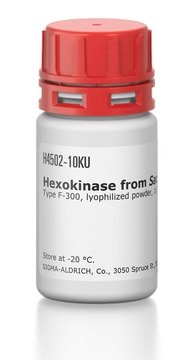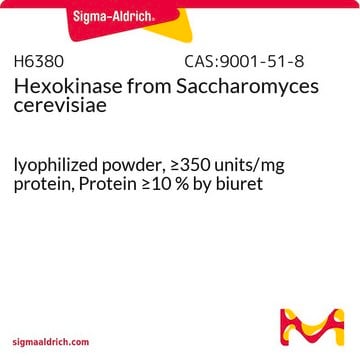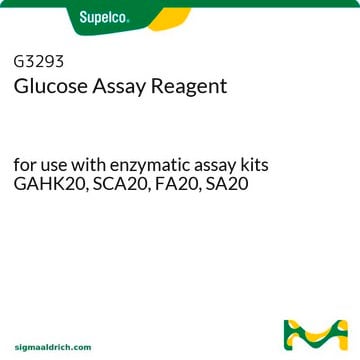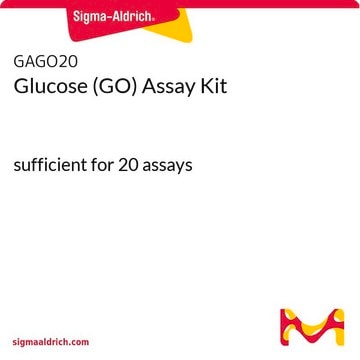P9544
Phosphoglucose Isomerase from rabbit muscle
Type XI, lyophilized powder, ≥200 units/mg protein
Synonym(s):
D-Glucose-6-phosphate ketol-isomerase, PGI, Phosphosaccharomutase
Sign Into View Organizational & Contract Pricing
All Photos(1)
About This Item
Recommended Products
biological source
rabbit muscle
type
Type XI
form
lyophilized powder
specific activity
≥200 units/mg protein
composition
protein, 70-100% biuret
storage temp.
−20°C
Looking for similar products? Visit Product Comparison Guide
Application
Phosphoglucose Isomerase (PGI) is an enzyme crucial for the interconversion of D-glucose 6-phosphate and D-fructose 6-phosphate. PGI is responsible for the second step of glycolysis and is involved in glucogenesis. It is highly conserved in bacteria and eukaryotes. It is used in sugar assays to convert fructose to glucose . Product 9544 is type XI and is from rabbit muscle. It is useful in enzyme systems requiring low sulfate.
Biochem/physiol Actions
Phosphoglucose Isomerase fuctions as an isomerase, neuroleukin, autocrine motility factor, and a differentiation and maturation mediator . It is responsible for the photosynthetic reduction of carbon.
Unit Definition
One unit will convert 1.0 μmole of D-fructose 6-phosphate to D-glucose 6-phosphate per min at pH 7.4 at 25 °C.
Physical form
Essentially sulfate-free powder containing citrate buffer salts
Signal Word
Danger
Hazard Statements
Precautionary Statements
Hazard Classifications
Resp. Sens. 1
Storage Class Code
10 - Combustible liquids
WGK
WGK 1
Flash Point(F)
Not applicable
Flash Point(C)
Not applicable
Personal Protective Equipment
dust mask type N95 (US), Eyeshields, Gloves
Certificates of Analysis (COA)
Search for Certificates of Analysis (COA) by entering the products Lot/Batch Number. Lot and Batch Numbers can be found on a product’s label following the words ‘Lot’ or ‘Batch’.
Already Own This Product?
Find documentation for the products that you have recently purchased in the Document Library.
Customers Also Viewed
B K Campbell et al.
Reproduction (Cambridge, England), 140(5), 721-732 (2010-08-19)
Glucose is a critical metabolic fuel in most mammals although many foodstuffs also contain high levels of the monosaccharides, galactose and fructose. The aims of this work were to determine the insulin response to challenges of these sugars (experiment 1)
Yunfeng Peng et al.
Physiologia plantarum, 148(4), 470-480 (2012-10-16)
Nitrogen (N) limitation reduces leaf growth and photosynthetic rates of maize (Zea mays), and constrains photosynthate translocation to developing ears. Additionally, the period from about 1 week before to 2 weeks after silking is critical for establishing the reproductive sink
C J Jeffery et al.
Biochemistry, 39(5), 955-964 (2000-02-02)
The multifunctional protein phosphoglucose isomerase, also known as neuroleukin, autocrine motility factor, and differentiation and maturation mediator, has different roles inside and outside the cell. In the cytoplasm, it catalyzes the second step in glycolysis. Outside the cell, it serves
Natsuko Miura et al.
Eukaryotic cell, 11(8), 1075-1082 (2012-07-04)
Glycolytic enzymes are cytosolic proteins, but they also play important extracellular roles in cell-cell communication and infection. We used Saccharomyces cerevisiae to analyze the secretory pathway of some of these enzymes, including enolase, phosphoglucose isomerase, triose phosphate isomerase, and fructose
Sean D Schoville et al.
PloS one, 7(6), e40035-e40035 (2012-07-07)
The marine copepod Tigriopus californicus lives in intertidal rock pools along the Pacific coast, where it exhibits strong, temporally stable population genetic structure. Previous allozyme surveys have found high frequency private alleles among neighboring subpopulations, indicating that there is limited
Our team of scientists has experience in all areas of research including Life Science, Material Science, Chemical Synthesis, Chromatography, Analytical and many others.
Contact Technical Service











